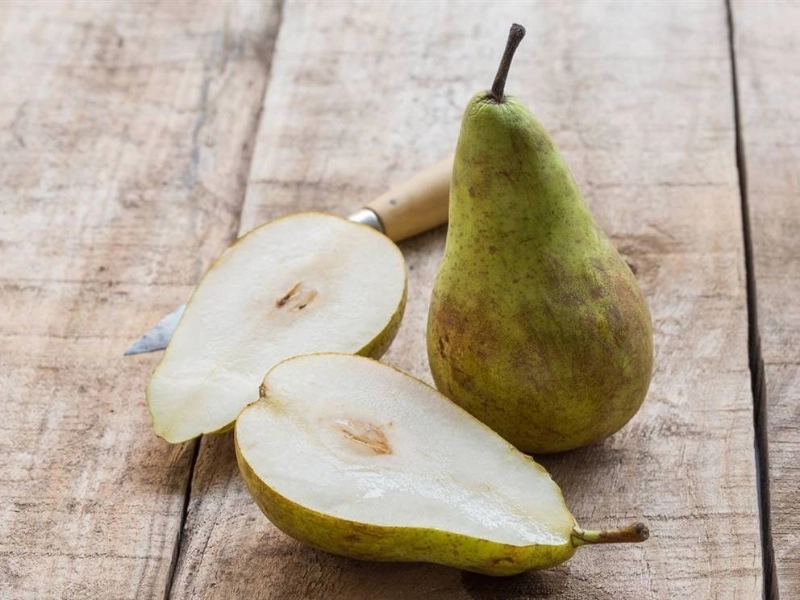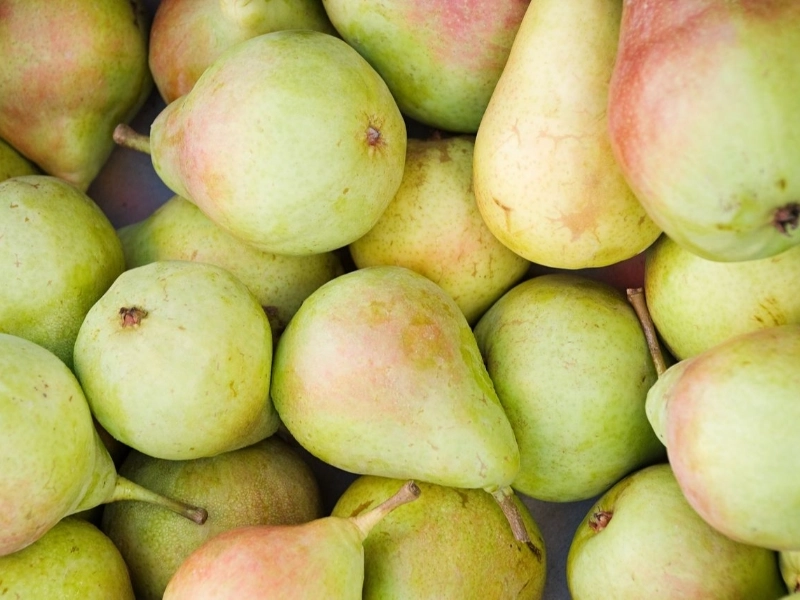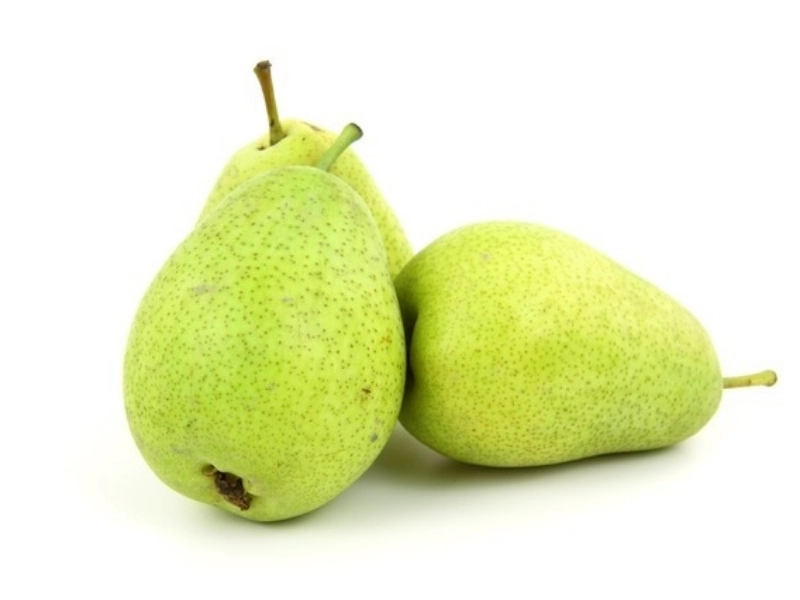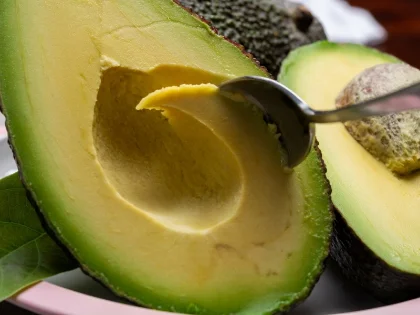Are Pears Beneficial For Hypertension?
Pear juice is a powerful complement to your diet. Vitamins, antioxidants and soluble fibers abound in fruit. Research has shown that, without harming good bacteria, phenolic chemicals found in fermented pear peel and juice could prevent dangerous bacteria like Helicobacter pylori, which causes stomach ulcers. Pears are an essential component of a diet that promotes heart health, as they are low in sodium and a rich source of potassium. Eat them raw or include them in your favorite recipes.
Little sodium

Lots of fiber
 Because pears are high in fiber, eating them can help reduce the risk of heart disease. The USDA Food Database indicates that one medium pear has approximately 6 grams of dietary fiber. Fiber has been shown to lower cholesterol, which may help reduce the risk of heart disease.
Each 80-gram serving of fruit per day, including pears, reduced the incidence of heart disease by 6% to 7%, according to a 2015 study of more than 30,000 women (2, 42). Pears include phytochemicals such as quercetin, which has anti-inflammatory properties and may improve cardiovascular health.
Pears can help your body maintain blood sugar levels and decrease constipation when consumed regularly. As long as you don't have allergies, dried pears are preferable to canned ones. Try to consume whole pears and stay away from processed juices, which usually contain a lot of sugar. Since most of the dietary fiber in pears is found in the skin, it is recommended to consume them this way.
Because pears are high in fiber, eating them can help reduce the risk of heart disease. The USDA Food Database indicates that one medium pear has approximately 6 grams of dietary fiber. Fiber has been shown to lower cholesterol, which may help reduce the risk of heart disease.
Each 80-gram serving of fruit per day, including pears, reduced the incidence of heart disease by 6% to 7%, according to a 2015 study of more than 30,000 women (2, 42). Pears include phytochemicals such as quercetin, which has anti-inflammatory properties and may improve cardiovascular health.
Pears can help your body maintain blood sugar levels and decrease constipation when consumed regularly. As long as you don't have allergies, dried pears are preferable to canned ones. Try to consume whole pears and stay away from processed juices, which usually contain a lot of sugar. Since most of the dietary fiber in pears is found in the skin, it is recommended to consume them this way.
High in potassium
 A medium pear is a low-potassium fruit and contains approximately 128 milligrams of potassium. However, if you have kidney disease and need to limit your potassium intake, it is essential to consider the amount in relation to your total diet and talk to your doctor or nutritionist. Make sure you eat pears packed in water or canned in their natural juice, not in sugar-filled syrup.
One medium pear provides 21% of the recommended daily intake of fiber, which is good for the digestive system, reduces the risk of heart disease and colon cancer, and promotes healthy weight loss. It is also a good supplier of potassium, necessary for the regularity of the heartbeat and muscle contraction. Pear peels include an antioxidant called quercetin, which may reduce risk factors for metabolic syndrome, such as high blood pressure and cholesterol. (3, 2)
A medium pear is a low-potassium fruit and contains approximately 128 milligrams of potassium. However, if you have kidney disease and need to limit your potassium intake, it is essential to consider the amount in relation to your total diet and talk to your doctor or nutritionist. Make sure you eat pears packed in water or canned in their natural juice, not in sugar-filled syrup.
One medium pear provides 21% of the recommended daily intake of fiber, which is good for the digestive system, reduces the risk of heart disease and colon cancer, and promotes healthy weight loss. It is also a good supplier of potassium, necessary for the regularity of the heartbeat and muscle contraction. Pear peels include an antioxidant called quercetin, which may reduce risk factors for metabolic syndrome, such as high blood pressure and cholesterol. (3, 2)
little sugar
 Due to their low sugar content, pears are a good option for diabetics. The amount of sugar in a medium-sized pear is just 17 grams. They are also high in fiber, which helps reduce the rate at which sugar is absorbed into the blood.
Pears can help you lose weight and lower blood pressure, which will improve your overall health. In one study, blood pressure and waist circumference decreased after 12 weeks in middle-aged adults with metabolic syndrome (a set of symptoms that increase the risk of heart disease).
Pears also have the benefit of being high in vitamin C. It is well known that vitamin C helps in defending against free radicals, which can damage the body and increase the risk of developing chronic diseases such as cancer and heart disease. A 2020 review published in Frontiers in Physiology suggests that increasing your intake of foods rich in vitamin C may reduce your chances of contracting certain diseases.
Due to their low sugar content, pears are a good option for diabetics. The amount of sugar in a medium-sized pear is just 17 grams. They are also high in fiber, which helps reduce the rate at which sugar is absorbed into the blood.
Pears can help you lose weight and lower blood pressure, which will improve your overall health. In one study, blood pressure and waist circumference decreased after 12 weeks in middle-aged adults with metabolic syndrome (a set of symptoms that increase the risk of heart disease).
Pears also have the benefit of being high in vitamin C. It is well known that vitamin C helps in defending against free radicals, which can damage the body and increase the risk of developing chronic diseases such as cancer and heart disease. A 2020 review published in Frontiers in Physiology suggests that increasing your intake of foods rich in vitamin C may reduce your chances of contracting certain diseases.












